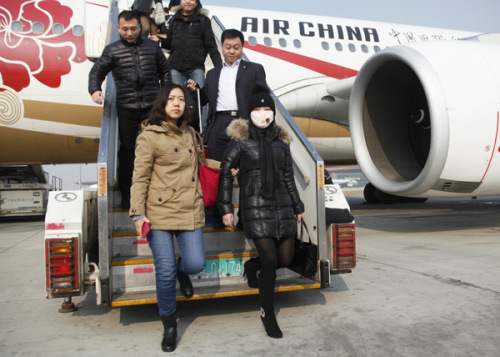


An economic fraud suspect (right) is returned to Beijing under police escort on Tuesday after 10 years on the run in Italy, marking the first extradition of its kind to China from a European country, according to the Ministry of Public Security. (Photo/Xinhua)
China will strengthen cooperation with the United States on major legal cases aimed at repatriating corrupt Chinese officials hiding there as well as confiscating their ill-gotten assets, a senior official of the Supreme People's Procuratorate said.
The remarks followed the news that one of China's most wanted fugitives is being prosecuted for immigration fraud and money-laundering by US law enforcement authorities.
China has "a priority list of alleged Chinese corrupt officials" believed to be at large in the US, and it has provided that list to US authorities to request their assistance, said Xu Jinhui, director under the SPP's anti-corruption and bribery bureau.
Chinese authorities will also start legal procedures to confiscate assets overseas, Xu said.
"Once in possession of solid evidence, we will initiate confiscation procedures according to the law," he said.
On Saturday, federal prosecutors in the US announced they have begun proceedings against Qiao Jianjun, a former officer of China Grain Reserves Corp who is suspected of fraud in obtaining his immigration visa when he entered the US. He also is suspected of transferring 300 million yuan ($48.4 million) to the US through money laundering.
Qiao's former wife was arrested by the FBI, and Qiao is being held. It is the first instance of a prosecution by US authorities of a suspected corrupt official from China.
In recent years, the US has become the most popular destination for corrupt officials to flee, transferring large amounts of illegal proceeds through various money-laundering schemes and underground banks. Since October, Chinese prosecutors have brought back 49 individuals suspected of duty-related crimes from 17 countries and regions, including the US, Canada and Australia.
Meanwhile, Chinese judicial authorities have seized 3 billion yuan ($483 million) of illgotten assets that were sent abroad.
Xu said that most of the those suspects are corrupt officials or senior directors of State-owned companies who took bribes or embezzled public funds.
Xu said that major progress was achieved by China and the US last year on fighting corruption. In October, the countries agreed to enhance cooperation and communication regarding cases under investigation, and on tracing, freezing, confiscating and returning illegal assets.
At a recent meeting of the Asia-Pacific Economic Cooperation in Beijing in November, APEC members, including the US, Canada and Australia, decided to set up a regional law enforcement cooperation network known as Act-Net to snare corrupt officials.
Successful model remains elusive
Somemajor obstacles remain between China and the United States on capturing Chinese officials at large in the US and recovering assets they stole, the authorities said.
"Due to lack of a bilateral extradition treaty and difficult legal obstacles, we are facing practical challenges in repatriating more Chinese fugitives to face trial and recover their illgotten assets," said Liu Dong, director of the Ministry of Public Security's economic crimes investigation bureau.
The two countries have yet to create a successful model for getting suspected corrupt officials back to China to face trial. Obstacles also hinder the progress of discussions about some individual cases.
US judicial authorities are prejudiced against China's legal system and "mistakenly believe we would undertake unfair prosecutions of suspects," Liu said.
According to the ministry, in the past 10 years only two Chinese fugitives have been brought back from the US to stand trial, including Yu Zhendong, former head of the Bank of China's Guangdong Kaiping branch, who was returned three years after fleeing to the US following corruption and embezzlement allegations.
By early last year, more than 150 suspected corrupt Chinese officials were on the run in the US. Some had even obtained permanent residency permits, or "green cards", in the US.
"It's necessary to set up a professional law enforcement team that better understands US laws and is proficient at speaking English and applying the laws," said Zhang Xiaoming, deputy director of the Judicial Assistance and Foreign Affairs department of the Ministry of Justice.
With greater understanding, Chinese authorities could provide their US counterparts with necessary documents in a timely fashion, including proper orders for assistance in locating and capturing fugitives.
 J-11 fighters in air exercise
J-11 fighters in air exercise Beauties dancing on the rings
Beauties dancing on the rings Attendants-to-be join Mr. & Miss Campus Contest
Attendants-to-be join Mr. & Miss Campus Contest Beijing's toughest anti-smoking law takes effect
Beijing's toughest anti-smoking law takes effect Family lives in cave for about 50 years in SW China
Family lives in cave for about 50 years in SW China PLA soldiers operating vehicle-mounted guns in drill
PLA soldiers operating vehicle-mounted guns in drill Blind carpenter in E China's Jiangxi
Blind carpenter in E China's Jiangxi China hosts overseas disaster relief exercise for the first time
China hosts overseas disaster relief exercise for the first time 20 pairs of twins who will become flight attendants in Sichuan
20 pairs of twins who will become flight attendants in Sichuan Obama is sowing discontent in S.China Sea
Obama is sowing discontent in S.China Sea Rescuers work through night to reach cruise ship survivors
Rescuers work through night to reach cruise ship survivors Driving through limbo
Driving through limbo Facing down MERS
Facing down MERSDay|Week